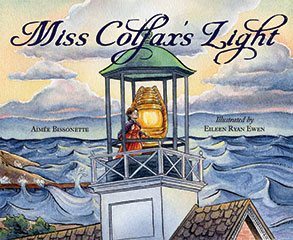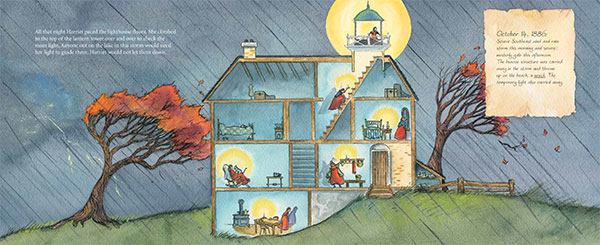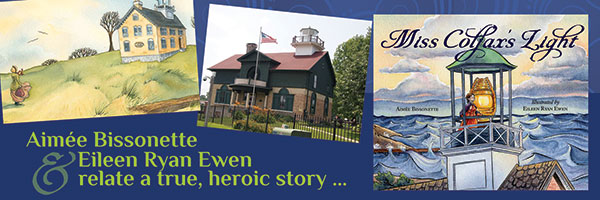 In this interview with Aimée Bissonette, author of Miss Colfax’s Light, our Bookstorm™ this month, we asked about writing and researching this nonfiction picture book biography.
In this interview with Aimée Bissonette, author of Miss Colfax’s Light, our Bookstorm™ this month, we asked about writing and researching this nonfiction picture book biography.
Aimée, thank you for sharing your experiences and discoveries with our readers. We’re excited about this book that showcases an Everyday Hero, one of America’s female lighthouse keepers.
 When you were writing this book, do you remember editing to include fewer details so the illustrator could do her work?
When you were writing this book, do you remember editing to include fewer details so the illustrator could do her work?
Yes, indeed! In fact, that’s half the joy of writing picture books — knowing the illustrator will fill in so many details. Eileen Ryan Ewen’s illustrations in this book provide wonderful factual material. Harriet’s clothing and household items in the book are just like the things Harriet would have worn and owned in the late 1800’s. I did not need to include descriptions in the text. Eileen included so much historical detail in her illustrations.
How did you learn that some people in the city felt Harriet “got her job only because her cousin was a U.S. Congressman”?
In writing the book, I did a lot of research. There were several written accounts of Harriet’s life and the docents at the Lighthouse Museum had a treasure trove of information about Harriet. My favorite source of information was Harriet herself. She kept a daily journal, called a log, starting in the 1870’s. The idea that Harriet’s cousin, Schuyler Colfax, a U.S. Congressman who later became Vice President of the United States, helped Harriet get her job was mentioned frequently in my sources. Specifically, it is mentioned in a 1904 Chicago Tribune newspaper article by a reporter who interviewed Harriet right before she retired.

There are short segments of entries from Harriet’s journal included throughout the book. Did you have to get permission to use those? How did you know who to ask?
Those short segments are entries from the “log” I mentioned above. Harriet maintained that log as part of her official lighthouse keeper duties so the log technically is “owned” by the U.S. Government. Her log is kept in the National Archives. I did not need to get permission to use it because it is not protected by copyright. Keep in mind, though, much of the material a writer uncovers while doing research for a nonfiction book is protected by copyright. Writers need to be aware of this and ask permission when they use other people’s copyrighted work in the books they write.
Did you have to research the Lighthouse Board and the Lighthouse Inspector before you could write this book?
The references in the book to the Lighthouse Board and Lighthouse Inspector are based on Harriet’s log entries. There are many more log entries than are included in the book — 30 years’ worth, in fact! Reading them was tremendously eye-opening. Harriet referred often to the Board and the Inspector in her entries. I did additional reading about the Lighthouse Board and how lighthouses were managed in the 1800’s, but mostly relied on Harriet’s own words when writing about the Board and Inspector.
Other than “I can do this,” there is no dialogue in the book. Why did you choose to leave out dialogue?
That’s a good question! I think the main reason is that, although I had Harriet’s log entries and her letters and I had a sense of what she might say and how she might say it, I didn’t know exactly what she would have said in a conversation. I felt if I made up dialogue, it would take away from the factual accuracy of the book. We can’t even be 100% certain that Harriet would have thought or said “I can do this.” But given all I learned about Harriet — her drive, her intelligence, the hardships she faced — I felt it fit and I allowed that one exception.

What do you want readers to know that they didn’t know before from the text you wrote?
I want readers to think about Harriet and others like her — the everyday heroes whose work makes life better for all of us. We don’t often think of lighthouse keepers as “heroes,” but the work Harriet did was critical to sea captains and sailors and the people of Indiana who depended on the goods brought in by ship. I also want readers to think about how Harriet and many other women of that time defied the restrictions placed on women and did incredible things — all without the cool technology we have today.
Would you have chosen to do Harriet’s job if you were alive then?
I like to think that I would have, yes. I think there is a little bit of me in Harriet. Like Harriet, I love a good challenge!

This sounds like a fascinating story…and how fortunate to have Harriet’s own log to draw upon. It’s a good case for keeping a journal/log even today!